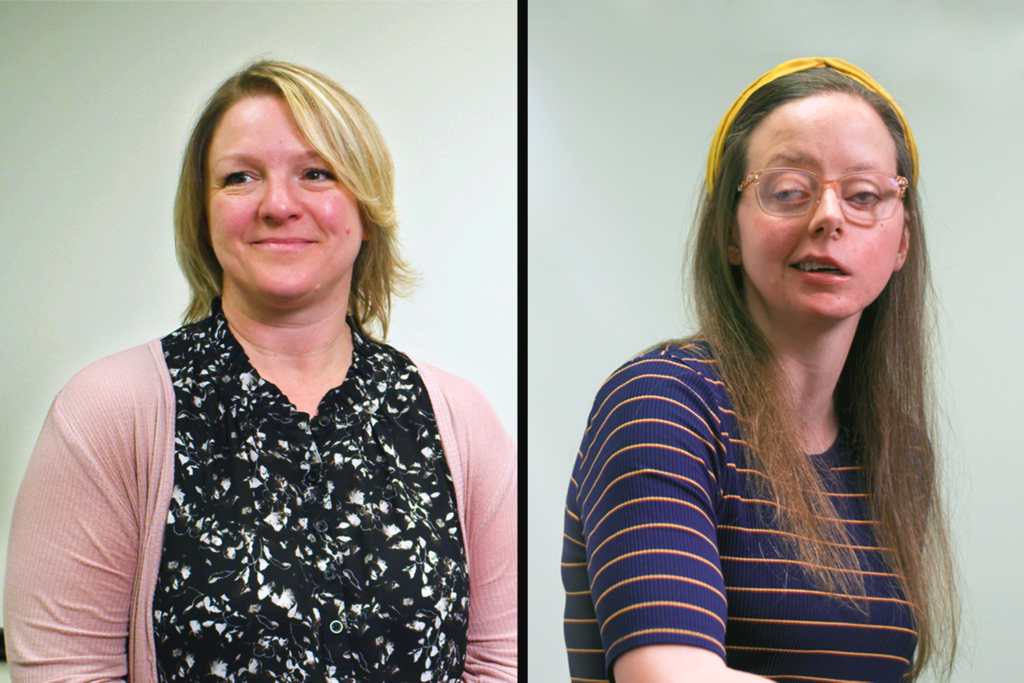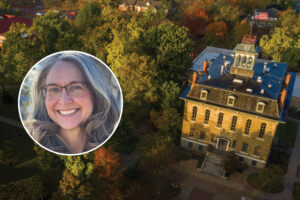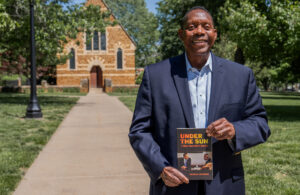To hear Deb Marszalek, ’22 MS-IDPT, and Allyson Sass, ’13, ’22 MS-IDPT, tell it, the last seven months have been a whirlwind. But then, that can be the perception when you go from a class assignment to winning an international leadership communications competition in three not-so-easy steps. View Video
In late October, Marszalek and Sass won the NATO-ACT/AECT Design and Development competition held at the 2022 annual convention of the Association for Educational Communications and Technology (AECT) in Las Vegas. Presenting a comprehensive and compelling plan to deliver leadership training to members of the North Atlantic Treaty Organization (NATO), they won top honors over two-person teams from Purdue University in West Lafayette, Indiana, and Brigham Young University in Provo, Utah. Marszalek and Sass were classmates in Baker’s master’s program in instructional design and performance technology before graduating in August and have become great friends since collaborating on this project. They also both work at the university.
Great sense of accomplishment
“From the moment of submission to winning seems like a whirlwind. We worked hard, and I am proud of the work we put together,” said Marszalek, director of faculty services for Baker’s School of Professional and Graduate Studies.
In addition to receiving a plaque and a small stipend that went back to Baker, Sass and Marszalek carried home an immense sense of pride and gratitude for the accomplishment.
“Just knowing we might be able to help NATO is a great feeling, too,” Marszalek said.
Sass, coordinator of faculty services for the School of Education’s graduate programs, added, “It was all a very quick turnaround that kept us on our toes. It was a really incredible experience, especially from the standpoint of what I learned. Our ideas were good. We gave unique approaches to leadership training. I know all of this wouldn’t have happened if I’d been working with any other person than Deb.”
Moving through the phases
The road to their Vegas victory began last April, when they began the first of three phases of the competition with a class assignment from Dr. Tracy Russo in their Instructional Design and Performance Technology Models class. That assignment entailed creating a 1,500-word overview of a solution to a problem statement provided by NATO-ACT (NATO’s Allied Command Transformation).
“NATO wanted a leadership program for members to improve cross-domain leadership skills,” Marszalek said.
One month later, Sass and Marszalek learned they were one of seven teams accepted into phase two, a 5,000-word deep dive into their solution, which included a 28-page written proposal, website, images, graphs, and tables. One of the perks of making it to phase two was being paired with a mentor—a thought leader from the business world or higher education—to provide guidance and help in putting together their presentation.
The Baker team was paired with Libby Farrelly, director of instructional design at Oriel STAT A MATRIX, a firm that designs training programs for using medical devices. Farrelly was a participant in the 2020 competition.
“All of her expertise and wisdom were incredibly helpful. We wouldn’t have won without her,” Sass said.
“The piece that set her apart was her ability to take the obvious to us and help us make it obvious to everyone else,” Marszalek said.
This feedback was instrumental in the development of their solution and presentation.
[Our] solution involved two-part training where leaders would first take an e-learning course . . . followed by a simulation where they’d encounter various leadership scenarios and make decisions,” Sass said. “[Those decisions] would then branch out into another situation where they’d be presented with more decisions to make. We made sure our training proposal was congruous to NATO’s daily environments and not done in a vacuum.”
Immense workload
Sass said the project involved an intense workload. There were many 12-hour work sessions, and often she and Marszalek worked 25 to 30 hours a week in the midst of completing their master’s program and working their full-time jobs, and Marszalek is a wife and mother to four children.
According to Marszalek, it all paid off when Dr. Russo told them that their phase one proposal was as good as anything she’d seen.
“She was adamant that we’d win the whole thing,” Sass said.
It turned out Dr. Russo was omniscient. Sass and Marszalek were selected as one of three teams to advance out of phase two to the third and final phase, which was a presentation of their plan in front of a judging body of NATO and AECT members in Las Vegas.
“It was less an academic presentation and more a sales pitch,” Sass said. “We knew we were going to be nervous, so we were encouraged by our mentor to practice. We probably went through our presentation six or seven times before the actual competition.”
Sass said her presentation efforts were bolstered by the communications training she received while double majoring in Spanish language and literature and international studies for her undergraduate degree on the Baldwin City campus.
“The communications skills I learned there helped me hone my skills,” she said. “It’s shaped me through work and life. I’m very thankful for all the opportunities I have been given.”
Opening doors
Marszalek said she’s excited by the prospect of NATO using pieces or all of her and Sass’s plan in future leadership communications. She and Sass also are quick to point out that past winners of the competition have had opportunities they might not otherwise have received. One that already has come their way is the invitation to serve as mentors to competitors in next year’s contest.
“This already has opened a lot of doors,” Marszalek said.
“I guess right now we’re just waiting for the right one,” Sass said. “This is a huge deal, even bigger than we realize, I think.”,





